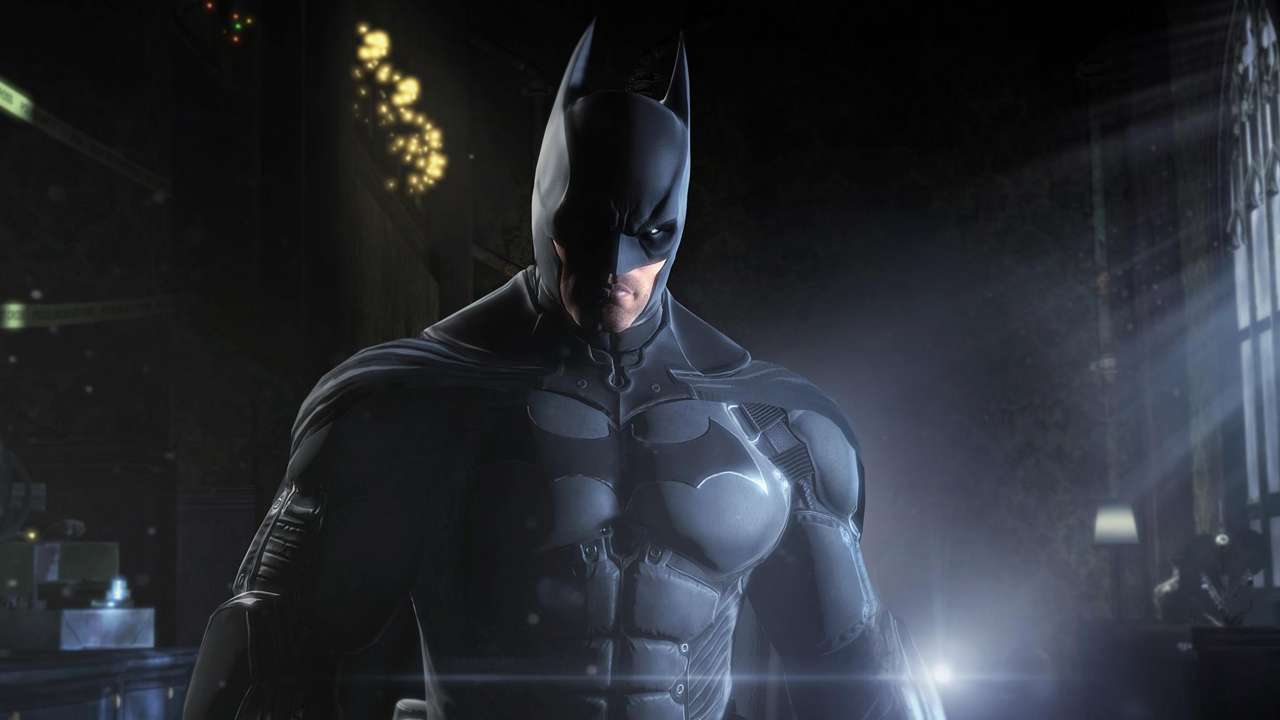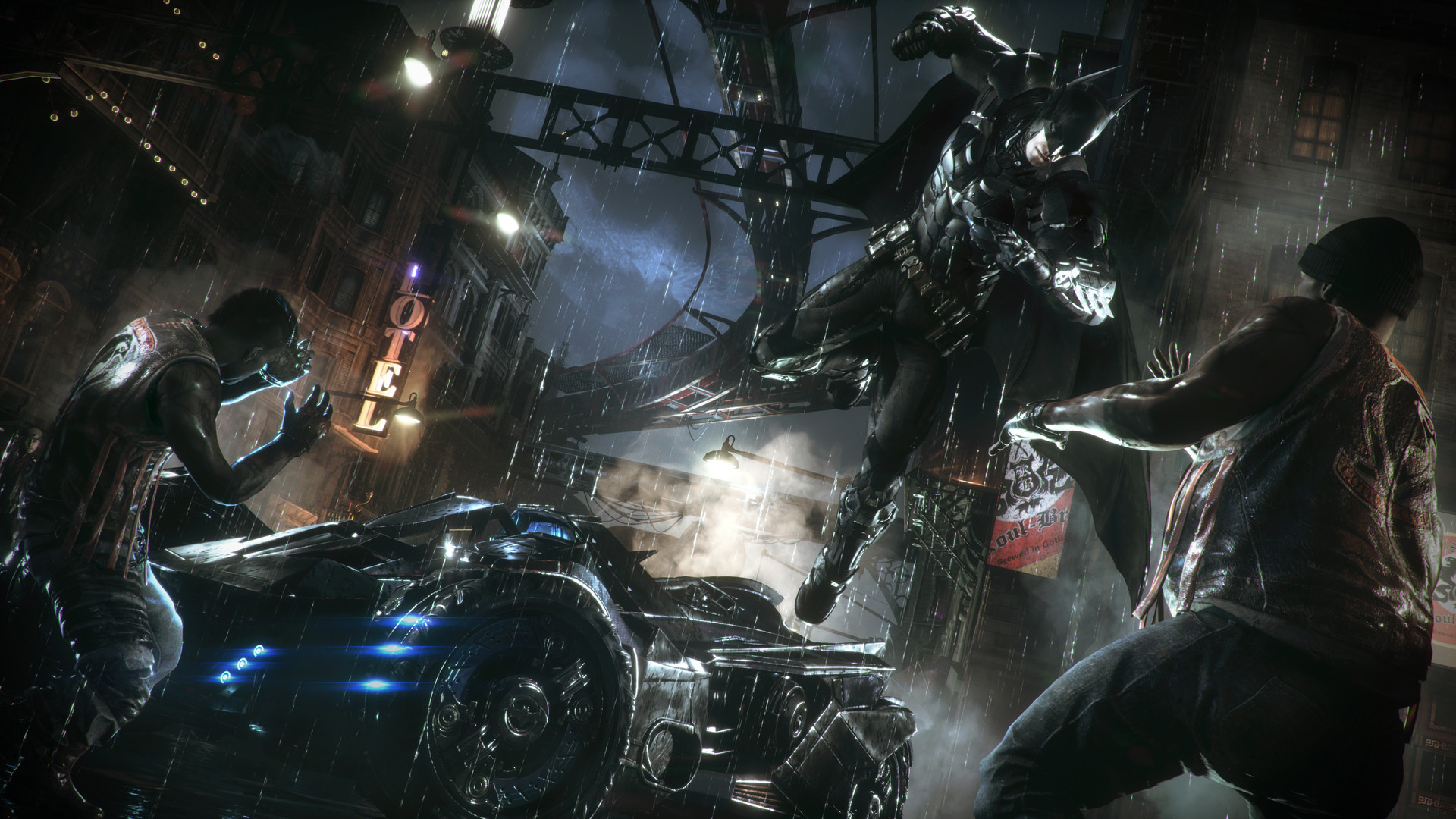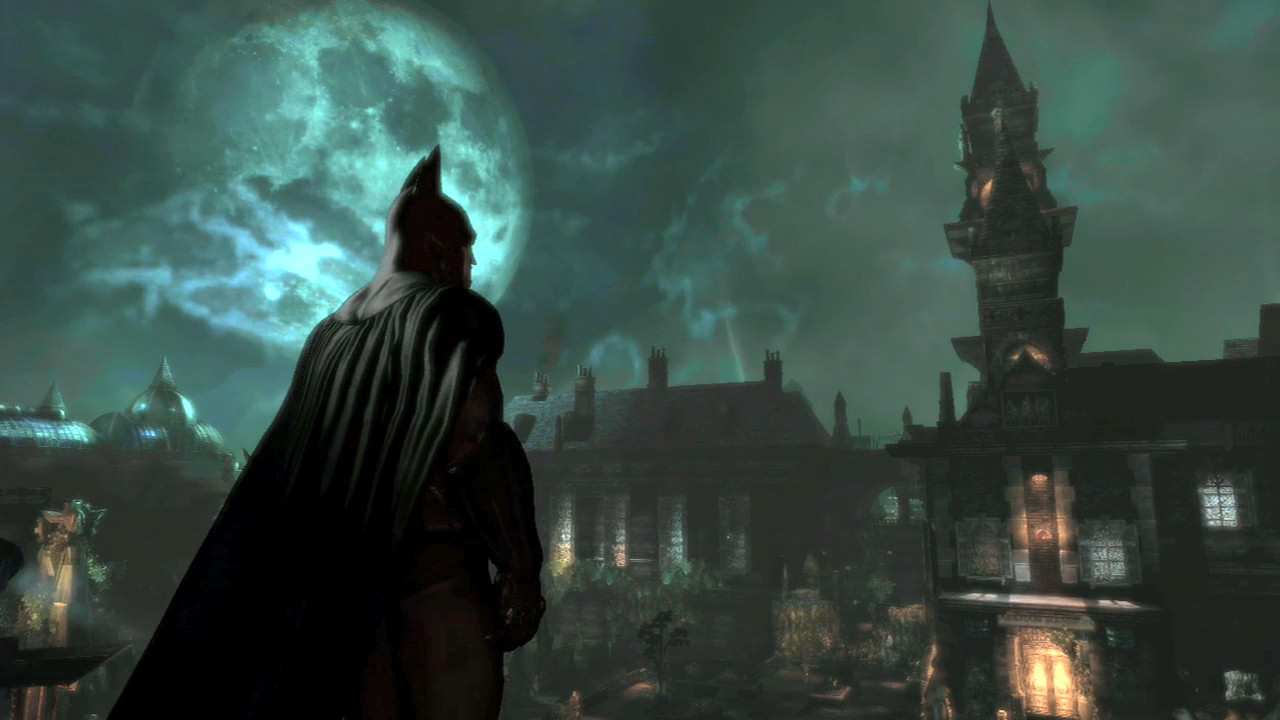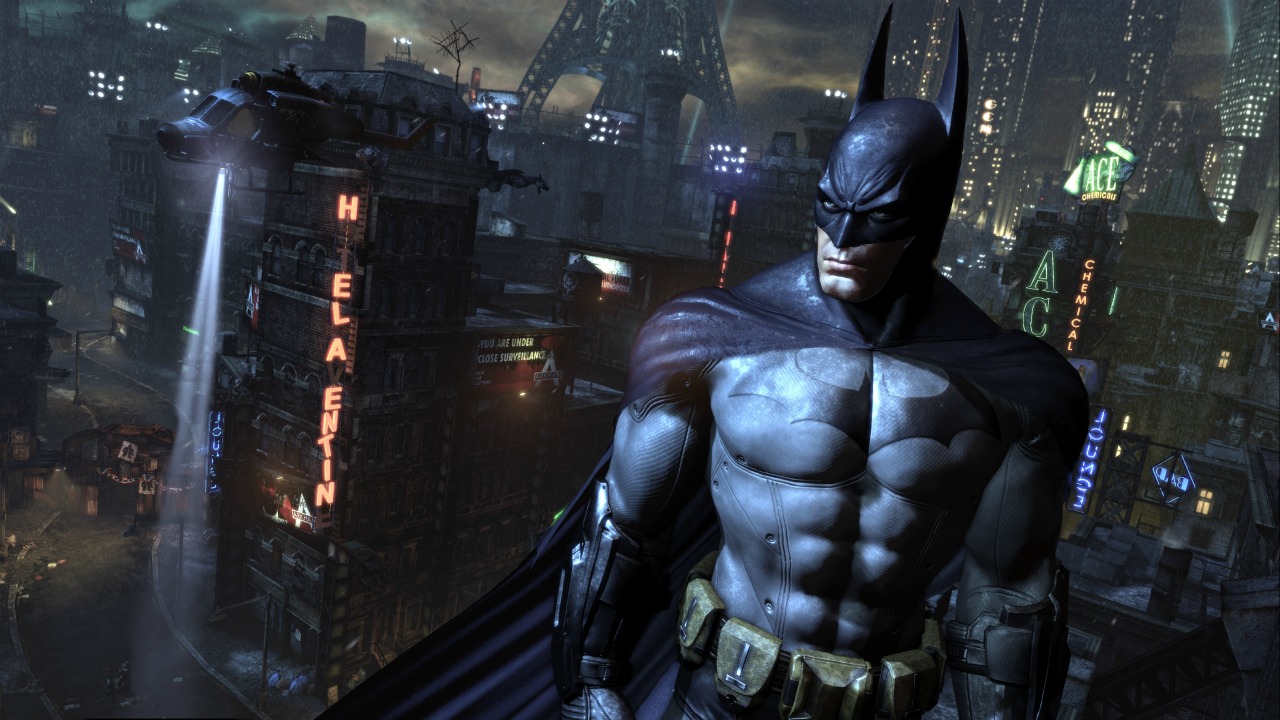Let's rank the Arkham games from worst to best
Four games in, which is Batman's finest moment?

Batman: Arkham Origins
Andy: Origins isn’t a terrible game, but it’s clear throughout that it wasn’t developed by Rocksteady. The new sections of the city are pretty uninspiring, particularly the industrial district and that tediously long bridge you have to travel back and forth across. And there’s no feeling of flow as you navigate the world either. I constantly find myself with nothing to grapple or land on, halting my momentum, which never happens in the other games.
Samuel: The city suffered from feeling anonymous. It may be my imagination, too, but I swear there was something off about the timing of counters compared to Rocksteady's Batman games—the same muscle memory felt like it didn't serve me well in Origins' combat. Having said that, I loved the crime scene investigations they added to Origins, which I (think) Arkham Knight ended up borrowing when you had to track down Oracle after she'd been kidnapped. They were probably the best bits of detective work in the series, and I did enjoy the one in Black Mask's penthouse.
Andy: I noticed the weird timing of the combat too when I reviewed it for PC Gamer. I looked into it at the time, and apparently WB Montreal had to recreate the combat system from scratch for some reason. Which may explain why it feels a bit like a bad cover version of a great song.
I loved the crime scene investigations. They were probably the best detective work in the series.
Samuel
Samuel: It's definitely a thing. I rinsed the challenge rooms in Arkham City and can still get a high score in every single one when I pick them up now—they feel irritatingly different. One thing I did like about Origins was the way the Cold, Cold Heart DLC adapted the classic Batman Animated Series episode 'Heart of Ice'. While WB Montreal's game mostly lacked the big hitter villains, I still felt like it was a worthy contribution to the games' own Batman canon. Troy Baker was an impressive Joker, and I enjoyed the fiery young version of Bruce Wayne, too, who knocks out an early villain in one punch instead of the whole thing turning into a boss battle.
Andy: I do like the younger, angrier Batman we get to play as in Origins. Kevin Conroy’s version of the character always sounds totally in control of his emotions. A mature, level-headed veteran of the crime-fightin’ business. But in this game he’s shouty and short-tempered, frequently arguing with Alfred, which is a nice way of making a familiar character feel different.
Tom S: There are some decent isolated bits of Origins, probably enough to make it worth playing for Batman fans—the tower converted into the Joker’s theme park, for example. However there is a sense that Origins is scraping around for new ideas. They expanded Gotham city and added… a warehouse district. The glue grenades and the non-lethal lightning fists feel like the sort of upgrades you might see on a cheap Batman toy rather than anything the Dark Knight would actually use. If you’ve completed every sidequest in Arkham Knight, crave more Bats, and don’t mind putting up with slightly-wrong combat then play this I guess?
Phil: I haven't played Origins yet, but, based on your recommendation there, Tom, I'm… well, still not sure if I'll bother.
The biggest gaming news, reviews and hardware deals
Keep up to date with the most important stories and the best deals, as picked by the PC Gamer team.
Samuel: It shows you can take the basic elements of a great game and make a comparably weaker product out of it, which is largely how I felt about what I played of Wolfenstein: The New Order's Old Blood expansion.

Batman: Arkham Knight
Andy: The batmobile really is a piece of shit. Those sections where you’re forced to fight dozens of identical drones with overly-telegraphed attacks is utterly mind-numbing. But when you’re doing what Batman does best, namely skulking around in the shadows and terrifying goons, Knight is a really, really good Arkham game, if a little too familiar at times.
Knight has some of the best individual moments of the whole series—including the spectacular Robin co-op level.
Tom S
Phil: The Batmobile churn really hurts Knight. There are some cool ideas here, like the military outposts—the best of which are mini-puzzles, challenging you to work out which of Batman's ever-growing toolset is key to clearing away the specific configuration of guards. That stuff is great, as are about half of the sidequests, the main mission design and so much of the writing. Best of all is the dual combat encounters, which turn the fluid dance of Batman's combat into a brutal duet. But then you're back in the Batmobile, side-dodging away from predictable fire patterns, or circling round a tiny bit of the city, trying to endure the incredibly dumb stealth sections.
Samuel: I didn't like the tank combat sections, particularly the stealth parts—but driving that thing around the city feels great. It's a gorgeously animated, hefty piece of machinery. It completes the Batman fantasy, in my opinion. In the post-game, with the city cleared of robot tanks, just bombing around and taking out clumps of criminals feels like the beginning of a Batman comic in motion. I've softened to Knight over time. The titular villain isn't particularly good, and they recast the Scarecrow in a way that made him sound way too similar to Hugo Strange in Arkham City, meaning the main narrative lacked a bit of City's menace and direction.
Andy: Yeah, the Arkham Knight himself is an incredibly lame villain. Troy Baker does his best with the script, but he isn’t intimidating at all. He sounds like a Californian surfer. Whenever he showed up, taunting me from his big dumb tank, I just felt annoyed. “Not this asshole again.” But I did love the section where Batman and Robin team up, even though it was criminally short-lived. The double-takedowns were really well animated and fun to pull off, and I think they tossed that idea out far too quickly.
Samuel: Totally with you on the Robin bits—phenomenal, especially The Joker singing to Batman while Robin sneaks around the stage in the background. I think Telltale's Batman game shows you can miss the mark with adapting the Dark Knight for a game and miss the most exciting parts of his universe and lore. The interactions between Batman and Robin, Oracle or Nightwing demonstrate a total understanding of why all the individual pieces of his world are so exciting. Those co-op moves with his allies are the perfect extension of those character relationships. The sidequests are more of a mixed bag. Chasing after Firefly in the Batmobile was just poor filler, but Man-Bat offered quite a spectacle, while Two-Face's heists were a nice remix of the game's existing stealth elements.
Phil: I don't know Batlore, but I liked the freaky pig-dude. He was messed up.
Samuel: By far my favourite sidequest in the game. The way they used the music and lights to point you towards where another body had been found. Doing those autopsies was disturbing, and even as someone who's read a bunch of comics featuring Professor Pyg, his reveal was a total surprise. Rocksteady isn't afraid of deep cuts in Batman lore. While it was only a momentary bit of narrative, the Hush sidequest had a neat and clever resolution, too.
Tom S: Arkham Knight has some of the best individual moments of the whole series—including the spectacular Robin co-op level and the levels that let you seamlessly infiltrate a couple of blimps in mid-air. Sadly it is a more inconsistent game overall. Everyone rightly hates the interminable tank sections (which get ridiculous towards the end of the game), and the PC version’s terrible launch didn’t help matters. It’s definitely worth playing if you enjoyed City, but it’s not the best Arkham game.

Batman: Arkham Asylum
Andy: The later games refined the brutal, rhythmic combat to something approaching perfection, and improved on almost everything else in some way, but I’ll always prefer Asylum’s focus on a single, wonderfully fleshed-out location over the sprawling open-world bloat of the sequels.
Samuel: I get that this focus (and the brilliant, memorable Scarecrow sequences) makes Asylum a popular choice, but it's a flawed game compared to the others in my opinion. This becomes apparent in the final third of the story where it feels like you're fighting versions of the Bane boss fight over and over again with those giant titan guys. The final fight with The Joker is kind of bad. The Killer Croc section drags on well past its welcome, too. There are no good boss battles in Asylum—nothing remotely close to the clever, Metal Gear-ish scrap with Mister Freeze in City.
City's paced so it keeps building in energy to its final act, and constantly showing you new parts of the world. Cutting out repetition and throwing in new ideas was essential for the series to grow, in my opinion, and while bigger doesn't always equal better, the escalation in ambition between the games is staggering. Few knew who Rocksteady were when Asylum was released. Now they're world beaters. To go from making the BioShock-y corridors of Arkham Asylum to building the Blade Runner-esque nighttime sprawl of Knight in just six years is absurdly impressive.
Phil: I think I might prefer City, but that's largely because I've never liked Metroidvania design. This is a very, very good version of it, but ultimately it's still a lot of back-and-forth between the same few areas. (You could argue the same for open-world Arkham, albeit on a bigger scale, but I think the way you traverse the larger space makes all the difference.) There are some incredibly accomplished setpieces here, and I love the simplicity of the combat before the extra gadgets of the later games. But Samuel's right about its pacing problems. Even some of its best sections—the weird, fourth-wall breaking Scarecrow vignettes—are lessened by the rubbish searchlight-based stealth puzzles that follow.
Samuel: For the time, it was a real surprise that someone had made a Batman game that good—the last decent effort dates back to the SNES. Its counter-focused melee combat system was deservedly influential, on the surface lacking the frantic speed and necessary button presses of something like Devil May Cry, but gradually growing in complexity as they weave more of the Dark Knight's tools into your arsenal. I've made this observation before on PCG, so apologies, but I remember feeling like Rocksteady had almost used this sequence from Batman Begins as their starting point for Batman's melee and stealth abilities in the Arkham games.
Andy: I’ve always been a fan of fiction that takes place in one location, so that’s why I think Asylum is still my favourite. Rocksteady absolutely stuffed that place with history and detail, and I like that the more time you spend there, the more familiar it becomes. I finished City and Knight and by the end of both I didn’t feel like I connected with the setting as much. I also like how lean Asylum is compared to the sequels, with simpler combat and fewer sidequests. It feels more elegant and streamlined than the busy open-world games. And there aren’t as many distractions being constantly thrown at you, which makes for a better-paced, more focused story overall.
Tom S: I liked the bit when you hit Bane with the Batmobile. That was some excellent Batman.

Batman: Arkham City
Andy: For me, City is when the Arkham series really started to feel like a Batman simulator. Being able to freely run, glide, and grapple around the rooftops of Gotham is brilliantly empowering, although I do find the constant chatter of bad guys in your ear massively annoying.
Samuel: When City was released, I remember thinking, 'this is all I've ever wanted from a Batman game'. Like you say, Andy, being able to glide around and grapple felt fantastic, both of which were elements of limited usage in Asylum. I loved the upgrades and momentum tweaks they made to the gliding—getting around that city felt phenomenal. It's also a very complete-feeling vision of Batman's universe, which I appreciate. Everyone from Mister Freeze to Calendar Man to Hush makes an appearance, complete with a not-embarrassing version of Robin. The Mad Hatter sidequest is brilliantly trippy. Rocksteady just get why Batman is so cool. Hugo Strange is a tremendous and very specific choice of (the apparent) main villain, too, offering a menacing tonal contrast to the Joker in Asylum.
It makes for a stronger core Batman fantasy than in Asylum—now you're hunting high above the thugs, free to engage or ignore them.
Phil
Phil: I love any open-world game with good traversal. I even love Prototype, which I know is a bit rubbish. Arkham City isn't rubbish, and, as Andy and Sam have already mentioned, its grappling hook/glide combo is top notch. It makes for a stronger core Batman fantasy than in Asylum—now you're hunting high above the thugs, free to engage or ignore them. In some ways it's a baggier game—that's inevitable given the structure—but it still holds true to everything that made Asylum great, and offers, to my mind, a better roster of villains and a more interesting story.
Tom S: The Mr. Freeze fight is ace, and an example of how Arkham City evolved beyond the ideas introduced in Arkham Asylum. The open world and the traversal have since become an integral part of the Batman fantasy for me—I can’t go back to Asylum—but City also has better storytelling (when it’s not just shouting exposition at you through loudspeakers). It’s the most complete and well-paced game of the series, with a brave and interesting ending. Some of the boss fights are absolute pants, though.
Samuel: Whereas I felt like the Riddles were a little exhausting in Knight, in City they were spot-on as neat visual or logic puzzles I could solve while travelling between parts of the story. The combat was significantly improved over Asylum, too, and mastering Batman's sets of tools in the challenge rooms—like Mr Freeze's ice bomb—meant that I ended up playing the post-game content for a lot longer than the story.
Shoutout to Rocksteady's artists, too, who created the most gorgeous, fan service-y alternate costumes for the Arkham games. I'm sure The Batman Incorporated skin in City was included just for me. While I think City is the most consistent of the four games, they've all got individually interesting elements, and Origins aside, I consider them all wonderful in their own way.
If it’s set in space, Andy will probably write about it. He loves sci-fi, adventure games, taking screenshots, Twin Peaks, weird sims, Alien: Isolation, and anything with a good story.


